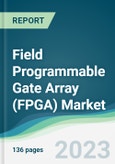The Field-Programmable Gate Array (FPGA) Market Study provides a comprehensive analysis of the global FPGA market, offering industry experts critical insights into market trends, technological advancements, and competitive dynamics. This summary, tailored for professionals in semiconductors, data centers, and telecommunications, highlights the key drivers, segmentation, geographical trends, and competitive developments shaping the FPGA market as of 2025, focusing on recent advancements and excluding data prior to 2023.
The FPGA market is experiencing robust growth driven by the increasing demand for data centers supporting IoT and 5G networks, as well as the need for optimized big data analytics. FPGAs are integral to modern embedded computing for mission-critical systems, offering versatility, accelerated development, and low one-time engineering costs. Their ability to enhance security and reduce costs makes them highly valuable, particularly in cloud environments where providers leverage FPGAs as Infrastructure as a Service (IaaS) to accelerate processes like network encoding, deep learning, and video conversion. However, the market faces challenges due to the complex design processes associated with FPGA implementation, which can hinder adoption.
A key driver of the FPGA market is the rising demand for data centers to handle data from IoT devices and 5G networks. Data centers rely on FPGAs to offload and expedite specialized functions, enhancing computational capacity for autonomous and data-intensive tasks. The Field-Programmable Gate Array (FPGA) Market Study notes that this demand is fueled by the proliferation of IoT-connected devices and the need for real-time performance in applications like big data analytics, where companies such as Amazon and Walmart utilize FPGAs for parallel operation execution to meet commercial demands.
The market is segmented by end-user industry, with the telecom segment poised for significant growth due to the need for high-speed data processing and transmission in 5G networks, cloud computing, and AI applications. FPGAs provide customized, efficient solutions for tasks like data encryption and compression, offering advantages over traditional ASICs. Geographically, North America holds a dominant share, driven by major FPGA manufacturers like Xilinx (AMD) and Intel (Altera). The U.S. benefits from government initiatives, including investments in domestic semiconductor manufacturing and Department of Defense projects for FPGA-based military applications, further bolstering market growth.
In the competitive landscape, the Field-Programmable Gate Array (FPGA) Market Study highlights recent innovations. In 2024, Intel introduced an advanced Agilex FPGA series optimized for AI and machine learning workloads, improving processing efficiency by 20% for data center applications. Similarly, AMD’s Xilinx division launched the Versal Premium series in 2024, enhancing 5G network performance with 30% faster data throughput, strengthening its position in telecom. Strategic collaborations, such as Intel’s 2024 partnership with a leading cloud provider to integrate FPGAs into IaaS offerings, underscore the industry’s focus on scalability and performance.
In conclusion, the Field-Programmable Gate Array (FPGA) Market Study is an essential resource for industry experts, providing a strategic guide to capitalize on opportunities in this dynamic market. With North America leading and telecom driving demand, innovations from players like Intel and AMD highlight the market’s potential to transform data-intensive applications, despite design challenges.
Key Benefits of this Report:
- Insightful Analysis: Gain detailed market insights covering major as well as emerging geographical regions, focusing on customer segments, government policies and socio-economic factors, consumer preferences, industry verticals, and other sub-segments.
- Competitive Landscape: Understand the strategic maneuvers employed by key players globally to understand possible market penetration with the correct strategy.
- Market Drivers & Future Trends: Explore the dynamic factors and pivotal market trends and how they will shape future market developments.
- Actionable Recommendations: Utilize the insights to exercise strategic decisions to uncover new business streams and revenues in a dynamic environment.
- Caters to a Wide Audience: Beneficial and cost-effective for startups, research institutions, consultants, SMEs, and large enterprises.
What do businesses use our reports for?
Industry and Market Insights, Opportunity Assessment, Product Demand Forecasting, Market Entry Strategy, Geographical Expansion, Capital Investment Decisions, Regulatory Framework & Implications, New Product Development, Competitive IntelligenceReport Coverage:
- Historical data from 2022 to 2024 & forecast data from 2025 to 2030
- Growth Opportunities, Challenges, Supply Chain Outlook, Regulatory Framework, and Trend Analysis
- Competitive Positioning, Strategies, and Market Share Analysis
- Revenue Growth and Forecast Assessment of segments and regions including countries
- Company Profiling (Strategies, Products, Financial Information, and Key Developments among others).
Market Segmentation:
BY ARCHITECTURE
- SRAM
- Flash
- Antifuse
BY END-USER INDUSTRY
- Automotive
- Manufacturing
- Telecom
- Aerospace and Defense
- Consumer Electronics
- Healthcare
- Others
BY GEOGRAPHY
- North America
- USA
- Canada
- Mexico
- South America
- Brazil
- Argentina
- Others
- Europe
- Germany
- France
- United Kingdom
- Spain
- Others
- Middle East and Africa
- Saudi Arabia
- United Arab Emirates
- Others
- Asia Pacific
- China
- Japan
- South Korea
- India
- Indonesia
- Thailand
- Taiwan
- Others
Table of Contents
Companies Mentioned
- Intel Corporation
- Microsemi
- Achronix Semiconductor Corporation
- Advanced Micro Devices, Inc.
- QuickLogic
- Microchip Technology Inc.
- Lattice Semiconductor Corporation
- Efinix, Inc.
- AMD
- Nvidia
Table Information
| Report Attribute | Details |
|---|---|
| No. of Pages | 149 |
| Published | July 2025 |
| Forecast Period | 2025 - 2030 |
| Estimated Market Value ( USD | $ 11.41 Billion |
| Forecasted Market Value ( USD | $ 17.758 Billion |
| Compound Annual Growth Rate | 9.2% |
| Regions Covered | Global |
| No. of Companies Mentioned | 10 |









